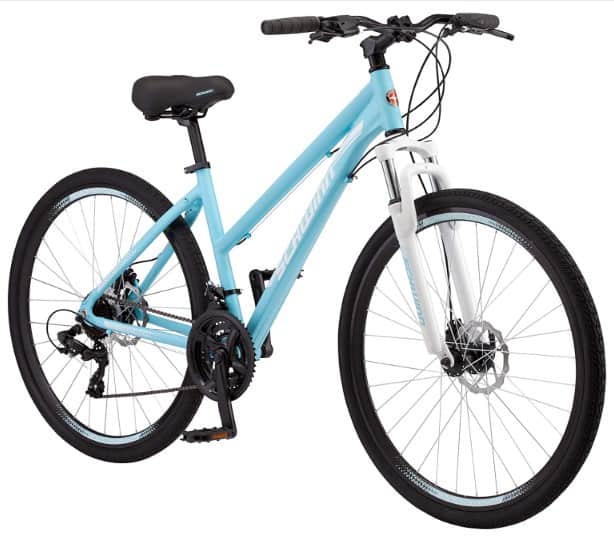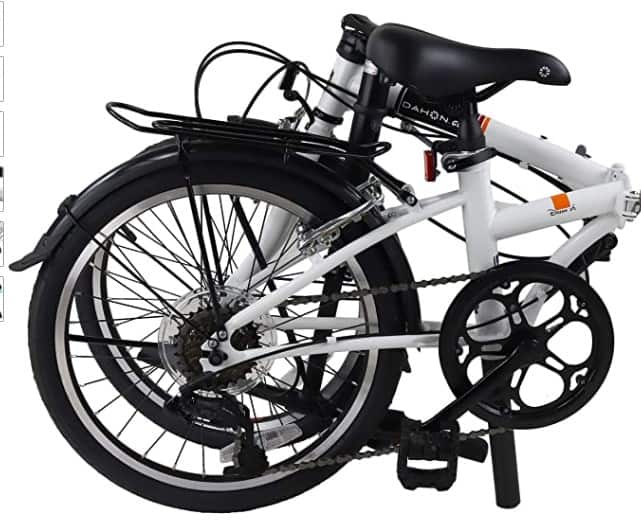The main component of a bicycle is its frame. However, these frames are made of different materials such as aluminum, titanium, and steel. Though steel is the main material on high-end bikes, how long will an aluminum bike frame last?
An aluminum bike frame can last between 5 to 10 years or more, depending on your riding style. Also, the lifespan of an aluminum bicycle frame is affected by environmental conditions, manufacturing design, and terrain.
However, unlike steel, aluminum has no fatigue limit (endurance limit), and it may fail even under low stress. So, it is prudent to look into how long an aluminum bike frame can last to clear all doubts.

Is An Aluminum Bike Frame Good?
The Good Part
- Light in Weight
Most entry-level bikes will have an aluminum frame. These bikes are lighter than other bikes. But are the frames good?
Although aluminum bike frames are about 0.5” thicker than steel frames, aluminum bikes are about 2 pounds lighter.
The extra material helps to make the frames stronger and more durable. Also, aluminum doesn’t rust as steel does.
- Aluminum Is Cheaper
The main reason why bike manufacturers introduced aluminum bike frames is that they were cheaper to produce. As a result, aluminum-framed bikes are more affordable and ideal for people on a low budget.
- Aluminum Frames Are Energy Efficient
At the same time, an aluminum frame doesn’t flex laterally, which makes it more efficient. So when you pedal hard the bike doesn’t twist and this reduces energy wastage.
Also, since the frames are light, aluminum-framed bicycles have better acceleration compared to other bikes.
- Can Be Molded To Aerodynamic Shapes
In addition, aluminum bike frames can be molded into aerodynamic shapes, which reduce air resistance when riding. As a result, a rider can maintain high speeds for a long time.

The Bad Part
- Doesn’t Last Long
Aluminum frames don’t last as long as other bike frames do. On average, aluminum frames last for about 6 years, while steel frames have an average lifespan of about 20 years or more.
Every time you place some weight on the bike, the frame gives in because aluminum doesn’t have fatigue limits.
- You Can’t Adjust The Chain Stays
Also, you can’t adjust your bike’s dropouts when you want to fit a hub of a different size.
- Hard To Repair
Unlike steel frames, aluminum bikes are hard to repair. Unfortunately, you don’t just go to any welder to repair an aluminum frame.
Aluminum welding requires specialized equipment and expertise. Unfortunately, after the first crack, it is hard to determine the integrity of the frame. Mostly, other faults show up almost immediately.
In fact, most frame builders refrain from repairing aluminum frames.
- They are Less Comfortable
Generally, aluminum frames are thicker than other frames. In addition, aluminum is rigid and doesn’t flex to dampen vibration. Therefore, most riders find aluminum-framed bikes to have harsher rides.
- The Frame Can Fail Without Warning
Aluminum frames are susceptible to sudden cracks and fail without prior signs. A sudden failure of a bike frame, while one is riding, can be catastrophic. All the same, you need to periodically check your bike for any possible dents, cracks, or crimping.
How Long Will An Aluminum Bike Frame Last – Do They Wear Out?
As earlier mentioned, aluminum frames don’t rust like steel, but do aluminum bike frames wear out?
First, aluminum bike frames corrode, but the corrosion doesn’t affect the bike, unlike other metal frames.
Technically, when exposed to air, aluminum forms a thin layer of aluminum oxide on the surface. Consequently, this film protects the metal underneath from more corrosion.

However, when aluminum is exposed to acids or bases outside the pH range of 4-9, violent corrosion occurs and leads to pitting.
Notably, bases corrode aluminum more than acids.
To avoid corrosion from taking place on your bike’s frame, you can use anodized paints such as the Dupli-Color MC201 Anodized Color to cover the surface of the frame. The high gloss paint is oil, gas, and heat resistant up to 500 degrees Fahrenheit.
On the other hand, aluminum wears out due to accumulative fatigue. As we had earlier noted, aluminum doesn’t have a fatigue limit. As a result, even small stress cycles can lead to frame failure.
Extreme temperatures also harm aluminum bike frames since they aren’t so flexible. Therefore, aluminum-framed bikes used through all seasons degrade faster.
So, do aluminum bike frames wear out? Yes, they do.
How Do I Know If My Aluminum Bike Frame Is Cracked?
Eventually, an aluminum frame is bound to fail though it might take some time. The best way to stay safe with an aluminum bike is to keep checking for cracks and dents. Actually, it is the surest way to tell if your bike’s frame is cracked.
Since most cracks happen at the welded parts, you should take anything that looks like a crack on these areas seriously.
Paint cracks should be pointers to a possibly cracked frame or one that is almost cracking. Flaking the paint from the frame (retouch later) will help to expose cracks.
Notably, frame fatigue failures can happen at any time, and you shouldn’t ride a bike that has signs of cracking. The results can be disastrous.
Can You Fix A Cracked Aluminum Bike Frame?
Repairing an aluminum bike frame is possible, but that comes with a host of challenges. Actually, fixing the frame is expensive and uncertain.
First, when an aluminum frame cracks, it is most likely that there are other faults. There is a high possibility of other parts of the frame breaking eventually.
In addition, welding aluminum requires special equipment, and the frame has to be heat treated once it’s welded. Unfortunately, it is hard to find shops that can weld aluminum and those that can mostly decline due to cost and liability issues.
Finally, repairing a broken aluminum frame may not make a lot of financial sense. The process is expensive, and the end product doesn’t have adequate strength.
Hence, though it’s possible to fix aluminum frames, most bike owners abandon them on cracking and get new ones.
If you need to buy a new bike with an alum frame, you may consider the 27.5” Royce Union RMT All-Terrain Mountain Bike (Amazon link). The 21-speed bike has an 18” frame, and it comes with the assembly tools you will require.

Other Frequently Asked Questions
How Much Weight Can An Aluminum Bike Frame Hold?
Most aluminum bike frames are rated as capable of holding up to 300lbs. But, all the same, they can handle much more. Actually, some can take up to 360 pounds without problems. However, it is safer to stick to the load tolerance rating given by the manufacturers.
Can You Repair Dented Aluminum Frames?
When your aluminum bike’s frame is dented, the best you can do is seek an expert’s opinion. The frame’s strength will definitely get compromised on deformation.
Notably, trying to pull out the dent will further interfere with the frame’s integrity.
Instead of trying to repair an aluminum bike frame, just retire it and get a new one.
Why Are Aluminum Bike Frames So Popular?
Although aluminum frames accumulate fatigue, it will take about 10 years of moderate riding for the frame to fail.
Actually, Alum frames are popular because they are affordable, lightweight, and they don’t rust. In addition, manufacturers like using aluminum because it is appropriate for mass production.
Does Welding Affect The Tensile Strength Of Aluminum?
Yes, welding adversely affects the tensile strength of alum bike frames. Mostly, manufacturers use heat-treated aluminum to make bike frames because they are stronger. But unfortunately, welding weakens the welded part and surrounding areas.
What Areas Are Susceptible To Cracks On An Aluminum Bike Frame?
Bicycle frames can crack anywhere, but some are more likely to break than others. In that case, the most fragile parts are the welds and inserts. These areas include:
- The bottom bracket
- Where chain stays connect to the bottom bracket
- The place Where the head tube joins the down tube
- Where the seat stays join to the seat tube
All the same, bike frames can break at weird places, especially in extreme riding.
Relevant Article:
- Is Hi-Ten steel good for bike frames?
- How Long Does a Carbon Bike Frame Last?
- How Long Does A Steel Bike Frame Last?
Final Thought
So, how long will an aluminum bike frame last is relative to many variables. But most of them boil down to how one uses the bike.
If you are the kind that does over 60,000 miles in a year on rugged terrains, I’m afraid the bike may not serve you for long.
The biggest issue with aluminum is that it has no fatigue limit, and small accumulative stresses will eventually break the frame.
Repairing an aluminum frame may not be of much help, and the best thing to do is to trash the frame and get a new one.
Frequently Asked Questions
Which bike frame material has the greatest longevity?
For superior endurance and dependability, many biking veterans and enthusiasts often lean towards Chromoly steel as their go-to bike frame material. Although carbon fiber is a favorite amongst racers due to its lightness, robustness, and aerodynamic qualities; it doesn’t necessarily hold the title for the long-lasting material. One should note that while carbon fiber makes for a fast ride, **Chromoly steel holds the fort when it comes to long-lasting bike frames**. It’s akin to the tortoise and the hare story, where speed might not always mean victory in durability.
How enduring is an aluminum bike?
Contrary to popular belief, aluminum frames actually pose as the shortest-living amongst other bike frame materials. Typically, a high-quality aluminum frame can last between 5-10 years or offer 10,000-30,000 miles of usage before needing a replacement. It’s like your average mid-range sedan, it gets the job done but refurbishment is always on the horizon. Now, comparing this to a standard steel frame, which with the proper love and care can last between 20 years to a lifetime, it’s clear to see that **aluminum frames do not offer the same longevity as their steel counterparts**. But, it’s all a matter of preference and intended use; want a quick spin around town, aluminum might just be your material.
Are aluminium bike frames worth it?
Aluminium bike frames have their pros and cons. On one hand, they offer affordability and decent performance, however, they may not provide the comfort many seek for adventure or mountain biking due to their rigid nature. Unlike titanium ones, aluminium frames are incapable of absorbing vibrations, making for a slightly bumpy ride. Comparing an aluminium frame’s riding quality to peers such as titanium and carbon, it falls a touch short. But **in terms of affordability and decent performance, aluminium bike frames can do the trick**, primarily if less strenuous biking is your goal.
Do steel bikes outlive aluminum ones?
The consensus amongst many in the biking community is that steel does in fact outlive aluminum. The key to steel’s longevity is its resilience and ability to withstand wear and tear better than aluminum. Aluminum, being more brittle, is prone to fatigue or damage—think of it as a domestic cat, spritely and nimble but less suited for the harsh wild. An unfortunate dent at the wrong spot on an aluminum frame could potentially deem it unsafe for riding. Therefore, **when meticulously manufactured and maintained, a steel bike frame can last a lifetime**, making it a trusty companion for your biking adventures.